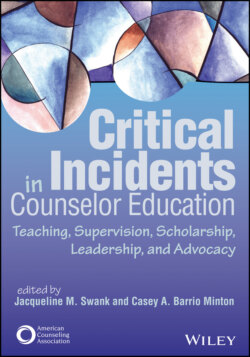Читать книгу Critical Incidents in Counselor Education - Группа авторов - Страница 53
Case Analysis and Discussion
ОглавлениеProfessor Edwards met with Beth to process the completed SL project, during which he encouraged Beth to reflect on her actions in light of specific standards in the ACA Code of Ethics (American Counseling Association [ACA], 2014). In only the first semester of her master’s program, Beth was practicing outside the boundaries of her competence in violation of Standard C.2.a. This standard is related to the general ethical principle of fidelity, and because competence is essential to good practice it is also related to the principles of beneficence (the obligation to benefit clients) and nonmaleficence (the obligation not to harm clients). Beth’s actions created a greater likelihood that she might harm, or fail to benefit, Quetzal. Professor Edwards added that counselors should also understand their own cultural identities and how these “affect their values and beliefs about the counseling process” (ACA, 2014, p. 4). For example, Beth ostensibly believed that taking Quetzal out of the group setting would be more beneficial than having him remain in the group. She did not appear to understand how her own cultural values might have contributed to this belief. Furthermore, Standard A.1.a. states that counselors should “respect the dignity and promote the welfare of clients.” By meeting with Quetzal individually, Beth was reducing his opportunity to develop interpersonal competence. There was thus a greater likelihood that, rather than promoting his welfare, she might harm, or fail to benefit, Quetzal. In addition, she gave Quetzal advice regarding eating habits. Beth’s recommendations were outside the scope of acceptable practice and also disregarded the important role the family’s cultural heritage played in influencing his diet.
Additional areas of concern pertain to Beth’s responsibility to communicate in open and honest ways (ACA, 2014). Beth did not appear to communicate honestly with Ms. Davenport when she asked to talk privately with Quetzal. One of the salient, fundamental rules for session facilitators explicitly stated that facilitators should avoid long conversations with participants. Beth appeared to take advantage of Ms. Davenport’s lack of understanding of the rules when she requested to speak with Quetzal. Beth repeated this action in a subsequent session when Ms. Mitchell was absent; she might have sought permission either from Ms. Mitchell by distance communication or from another school counselor at CMS. This example pertains to the ethical principle of veracity, or “dealing truthfully with individuals” (ACA, 2014, p. 3).
Although an important distinction should be made regarding Ms. Mitchell’s role as an SL supervisor as opposed to an internship supervisor, it appears that she neglected her responsibility to provide Beth with adequate SL supervision. Ms. Mitchell cofacilitated sessions with Beth and gave her immediate feedback on her performance following the first session. However, when she missed two group sessions and did not provide Beth with distance supervision or an alternative qualified supervisor, there was a lapse in the monitoring of Beth’s performance. Ms. Mitchell was neglectful in that she did not provide Beth with a method for maintaining contact or a contingency plan in the event that Ms. Mitchell was unable to cofacilitate the group session. This contingency plan could have included having an alternative method for distance supervision or arranging for another school counselor to monitor Beth’s performance and provide her with feedback.
Professor Edwards recognized that in some instances Beth acted inappropriately, and in other instances her developmental needs had been neglected or underserved. In processing these events, he distinguished between these two sets of issues. He acknowledged that there were ways he could improve as an instructor with regard to supporting Beth during the SL project. He also encouraged Beth to use these events as an opportunity for learning and to incorporate them into her final reflection paper. He reminded her that her course evaluation and grade would be based primarily on the quality of her reflections on her SL project and her poster.
